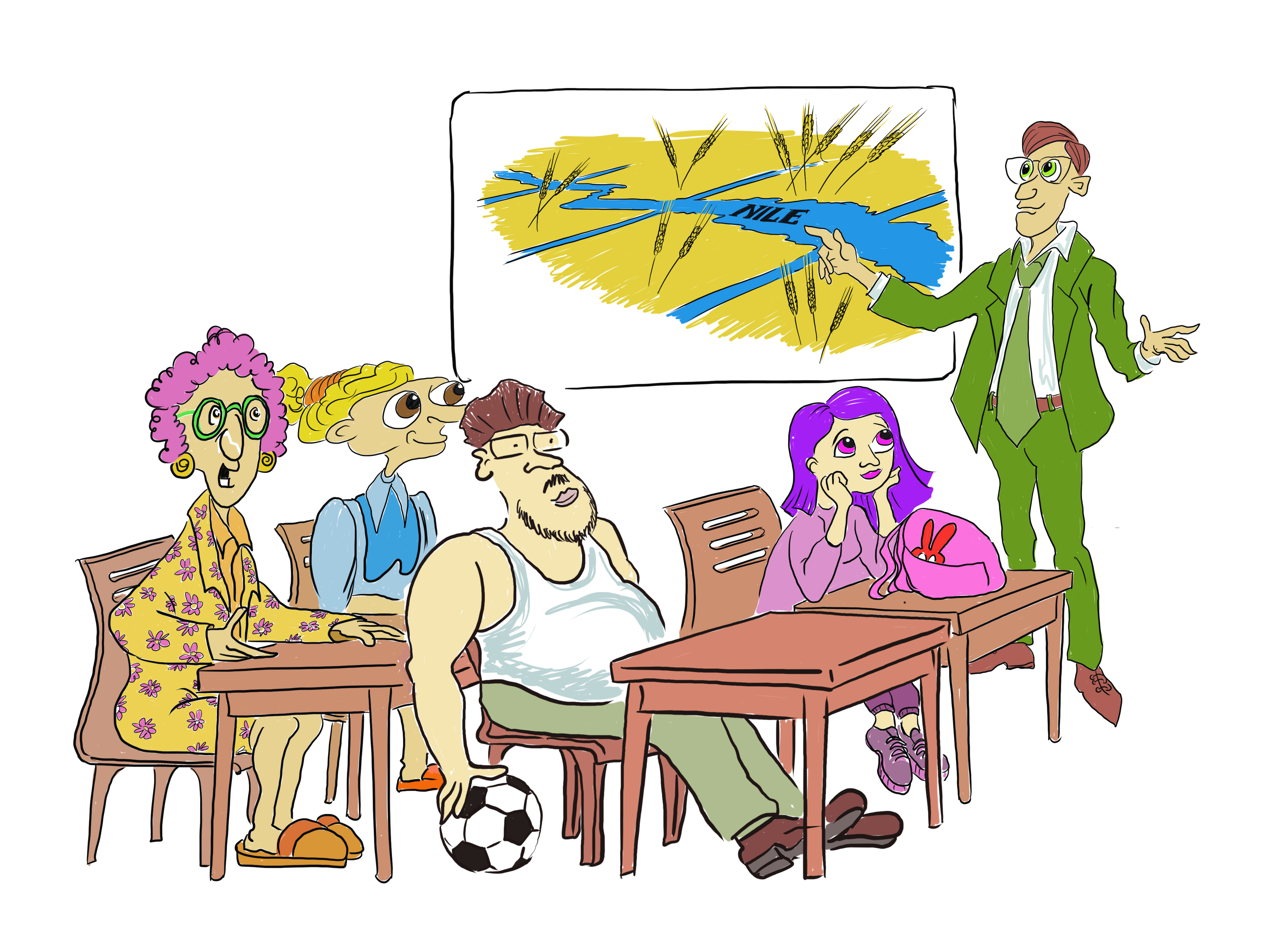Along the banks of the Nile

Ida did come back. Probably thanks to Vera’s powerful persuasive techniques. Of course, she didn’t apologize for calling me a stupid teacher. Franko came back too. And he looked in high spirits.
“Hi, Ida!” he said.
Ida didn’t reply. I noticed she was wearing shoes without laces.
“This time Franko will sit in the front row,” commanded Vera.
“OK,” said Franko.
At this moment my second-born, Vesna, came through the door yelling: “I want to join the Math History Circle too!”
“No,” I said.
“Of course she can,” said Franko.
“She only wants to be here because I forbade her,” I said. “She is not in the least interested in ancient math.”
“I am not interested either, but you let me be here anyway,” argued Franko.
“Good,” I said. “Wonderful.”
“She can be here,” said Vera. “Please start.”
What could I do. So I started. Franko and Vesna in the first row, Vera and Ida in the second.
I started: “The fifth, fourth, and third millennia B.C. saw dramatic changes in society. Not everywhere, however. But especially along the banks of the Nile, the Tigris and Euphrates, the Indus, the changes were huge. Most of all, people tried to control the water. Dams were built, canals were dug, swamps were drained. And consequently, there were more crops, and life was better. But of course – not for everyone. New social classes appeared: artisans, clerks, farmers, scribes, serfs, slaves. Aristocracy appeared.”
“Hell, yeah!” exclaimed Franko. “I knew it! Bloody aristocracy!”
“Shut up, you communist!” said Vera.
Back in the time when we were part of Yugoslavia, Franko was indeed a communist. I mean, he was a member of the party, but I doubt he really believed in anything. As far as I know him, he believed only in watching soccer and chasing women.
“Vera, please,” I said.
“What is a communist?” asked Vesna.
“Ah, don’t worry. Just an animal,” said Franko.
Ida was suddenly laughing like crazy. Until then I’d thought she hated or at least heavily disliked Franko.
“An insect?” asked Vesna.
“Yes,” said Vera.
“Please!” I exclaimed. “Even children have a longer attention span than you!”
“I don’t believe it’s an animal,” replied Vesna.
“Yes, it is!” insisted Vera.
And we all understood she meant it.
“Shut up, you old crazy woman!” said Franko.
Ida almost fell from her chair.
“Is this mathematics?” asked my wife. She’d heard our loud conversation and came to check if everything was OK.
“Everything is mathematics, dad always says,” said Vesna.
“No, this is not,” I said.
My wife left. Vesna went running after her while screaming: “It is so boring!”
I continued: “So, what were the activities that triggered the development of mathematics the most? Trading, the collection of taxes, harvest administration, and calendar computation. But after some time, some people started studying mathematics also just because it appeared to be interesting. Math was no longer only a bunch of practical computations, it became theoretical and it started becoming abstract. It became a part of human culture, although known only to a handful of individuals.”
“It still is,” said Vera. “Known only to a handful of crazy individuals.”
“But these individuals achieved truly great things. And of the Egyptian, Chinese, Indian, and Mesopotamian mathematics, the latter was the most developed. This might be because Mesopotamia was the crossroads for many caravan routes and because the Tigris and the Euphrates were more difficult to handle compared to, for example, the Nile.”
“I don’t believe mathematics was used to handle rivers, young man,” said Franko. “I don’t want to listen to this nonsense.”
“Yeah, you will not see me here ever again!” exclaimed Ida. And she left the room.
This was the end of another highly fruitful math session. I was ecstatic.
